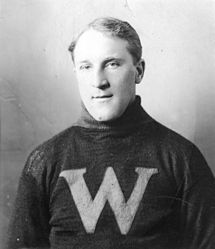Moose Johnson
| Moose Johnson | |||
|---|---|---|---|
| Hockey Hall of Fame, 1952 | |||

Johnson in 1912 with the New Westminster Royals.
|
|||
| Born |
February 26, 1886 Montreal, QC, CAN |
||
| Died | March 25, 1963 (aged 77) White Rock, BC, CAN |
||
| Height | 5 ft 11 in (180 cm) | ||
| Weight | 185 lb (84 kg; 13 st 3 lb) | ||
| Position | Defence | ||
| Shot | Left | ||
| Played for |
Montreal Hockey Club Montreal Wanderers New Westminster Royals Portland Rosebuds |
||
| Playing career | 1905–1931 | ||
Thomas Ernest "Ernie, Moose" Johnson (February 26, 1886 – March 25, 1963) was a Canadian ice hockey player whose professional career spanned from 1905 to 1931. He was a member of four Stanley Cup winning teams between 1905 and 1910 with the Montreal Wanderers of the Eastern Canada Amateur Hockey Association (ECAHA) and later the National Hockey Association (NHA). He moved west, and switched from left wing to defence, in 1911 to join the newly formed Pacific Coast Hockey Association (PCHA). He spent the following decade playing with the New Westminster Royals, Portland Rosebuds and Victoria Aristocrats where he was named a PCHA first-team all-star eight times and played in the 1916 Stanley Cup Finals with Portland. He later played minor professional hockey in California, Minnesota and Oregon before retiring at the age of 45. Johnson was known for using perhaps the longest stick in the game's history, giving him a 99-inch reach. He was inducted into the Hockey Hall of Fame in 1952.
Johnson's playing career began in 1902 in the Montreal City Hockey League where he would, at times, play with his junior, intermediate and senior teams all in the same weekend. He moved on to the Canadian Amateur Hockey League in 1903 and played two seasons with the Montreal Hockey Club, scoring 9 goals in 11 games in that time. He then moved on to join the Montreal Wanderers of the newly formed Eastern Canada Amateur Hockey Association in 1905, and finished tenth in league scoring with 12 goals. The Wanderers tied with Ottawa HC for the best record in the league with 9–1 records, necessitating a playoff to determine the league champion. Johnson scored a goal in the first game of the two-game, total goal series as Montreal won 9–1 on home ice. Ottawa came back to lead the second game 9–1, and tie the series, but two late goals by Montreal's Lester Patrick gave Montreal the victory, 12–10 on aggregate, to win both the ECAHA championship, and the Stanley Cup as Canada's national amateur champions.
...
Wikipedia
